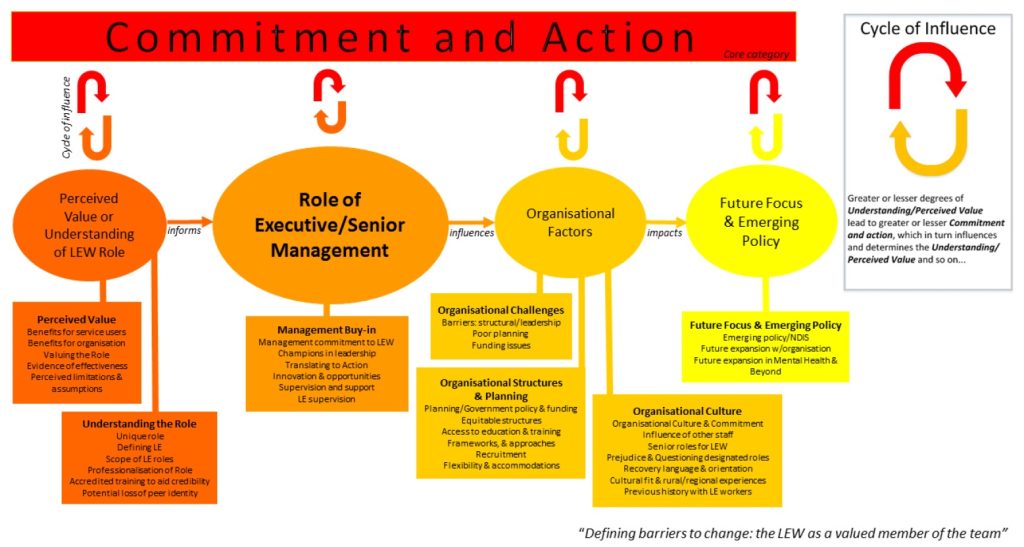Identifying Barriers to Change
Byrne, L., Roennfeldt, H., & O’Shea, P. (2017). Identifying barriers to change: The lived experience worker as a valued member of the mental health team. CQ University Australia. https://mhcsa.org.au/wp-content/uploads/2021/12/Attachment-1-Identifying-barriers-to-change-The-lived-experience-worker-as-a-valued-member-of-the-mental-health-team-final-report.pdf
Why do some organisations have more Lived Experience roles than others?
Take Home Messages
- Strong leadership and commitment from senior managers are crucial for the success of Lived Experience roles
- Managers with more exposure to Lived Experience roles value them more and are more likely to support their growth.
- Clear recruitment processes and well-defined roles improve outcomes for Lived Experience workers.
- Integrating Lived Experience roles into all levels, with flexible policies and strong supervision, drives their success.
Aim
To explore the views of executive and senior managers in relation to their understanding of the Lived Experience workforce and why some organisations employ more than others.
Background
The Australian Lived Experience workforce refers to a number of different roles including peer support workers, consumer consultants, consumer companions, experts by experience. The workforce also includes other Lived Experience roles across diverse sectors such as education, training, advocacy, and policy.
While the australian Lived Experience workforce is growing rapidly, the roles are often ad hoc and the way they are collaborated with or utilised, varies greatly across roles and organisations.
Method
Twenty-nine participants were interviewed or participated in focus groups, with 16 being from not-for-profit organisations and 13 from state government organisations.
Questions included the barriers and enablers facing the Lived Experience workforce, including why some organisations embrace Lived Experience workers more than others.
Results
Results showed that senior management commitment and action was key to the success of Lived Experience roles.
Managers understanding about Lived Experience roles and how much they saw value in them was proportionally related to the amount of commitment and action those managers took to employ and support the Lived Experience workforce.
The degree of managers commitment has an impact on the growth of the Lived Experience workforce, both within organisations and outside of the mental health sector – where the more commitment, the greater the growth.
The diagram below shows the core category from the interviews and focus groups – “Commitment and Action” and the major categories and sub-categories. The key concepts that relate to each category are shown in the boxes at the bottom of the diagram.

Discussion
Senior managers provided important leadership when it came to the development of Lived Experience roles. The personal and organisational commitment that the Managers had increased both investment and clarity of the benefits of the Lived Experience workforce. These managers also saw that any risks taken to ensure the development of the Lived Experience workforce, were worth taking.
The more exposure managers had with Lived Experience roles, the more they understood and valued the roles. Those who had more exposure also had more confidence in the capacity of Lived Experience workers.
When managers reported a negative experience with a Lived Experience worker they often said it was due to poor recruitment or poor role clarity. Those from organisations with more experience employing Lived Experience workers said that as they understood the roles more, respective changes were made to the recruitment process.
Managers identified a number of benefits of Lived Experience workers which stretched across the organisation and included by co-workers and service users. Specifically, Lived Experience workers were dais to promote and provide: empathy, hope, equality, trust, mutuality, connection, understanding and education. They were also seen to increase recovery orientation and reduce stigma.
When managers didn’t understand Lived Experience roles or their benefits then there was a greater risk of the roles being absorbed into traditional ways of working. When Lived Experience roles are co-opted like this, they become less impactful and bring fewer benefits. Conversely, when the roles were understood their uniqueness was protected and reinforced.
Lived Experience workers had to face challenges such as prejudicial attitudes towards both their own roles and workforce, and also towards service users. However, when colleagues had more experience with Lived Experience workers the fear and negative attitudes towards people with a lived experience were reduced and understanding and empathy was increased.
Champions were those who advocated for Lived Experience roles and were willing to share power. Champions were noted as a key part of the campaign for valued and supported Lived Experience roles.
When Lived Experience workers were in senior management roles, they were able to provide greater opportunities for cultural and organisational change via their position and presence at key meetings.
Flexibility over and above key guidelines and structure, supported Lived Experience roles and supported a stronger recovery approach.
The professionalisation of the Lived Experience workforce was seen as both beneficial for credibility and status, but also could be barrier by increasing the risk of co-option of the roles. However, the development and training of the Lived Experience workforce was seen as desirable.
While there was varied views on reasonable accommodations, most managers said that flexibility was key in both Lived Experience roles and non-Lived Experience roles.
A whole-of-service approach was seen as including:
- Culture and policies, which helps prepare the organisation for Lived Experience roles
- Equitable structures, which aids Lived Experience success and career pathways, training and education
- Supervision, support and flexibility which maximises the success of Lived Experience roles
Recommendations
Provide enough opportunities to increase the understanding of, and exposure to, Lived Experience roles via:
- Education and training
- Networks and communities of practice with other organisations with Lived Experience workers
- Employ Lived Experience workers in senior roles
To aid in the success and development of the Lived Experience workforce, senior managers are recommended to increase:
- Investment
- Commitment
- Innovation
- ‘Champions’
- Planning
- Time
Addressing role clarity, support and supervision and equitable structures are also key for senior managers to address in order to maximise the successful development of the Lived Experience workforce.
